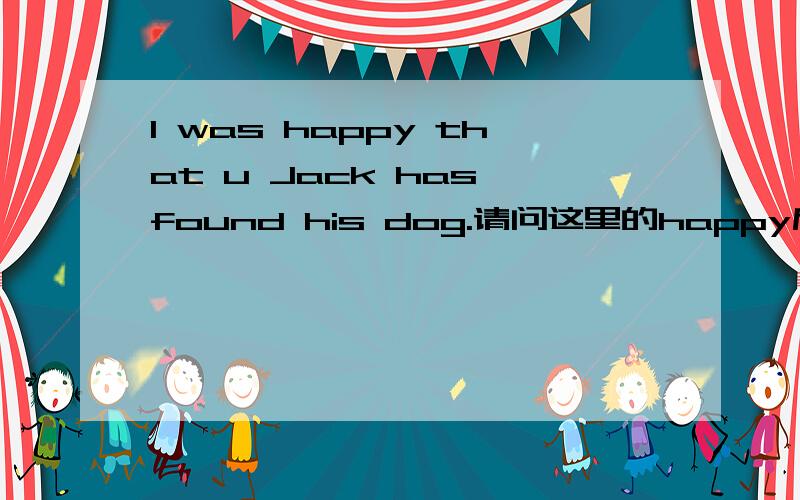I was happy that u Jack has found his dog.请问这里的happy后面是个什么从句呢.
来源:学生作业帮助网 编辑:作业帮 时间:2024/11/27 04:31:48

x��S�N�@����~
��_H!� U}3w'!I !
�
�
���������Yo���dYk�̙3g��3�O䛦�y-��N��e�B>k3_�N��Wg�|J'�� �<�5[
��
^߈J�\
�:������oR�%
v;��ɏ���$� � �1$�tˬ�ʯ
8�FL��-qqJ�
;��s�=�[��? �x
�6���ӥA��_��`
{2s����5�y
��j����3ڊ�|��L�]AE��vJ%`�]����g�_�َ��㜬z�U���:|�]%F�*��d35?f� y3�u:`��S�$ 8�De0�b�����}d8B��
��c�˱��Ѡ-���7+ZP�)EY֠����m�zE��3;'���nN��{���~OA@����`֨��2�( d�������1����,S�+���
�YV���
d�Bc9�u�Xc�
��"E�����F�J�����9I洅���w�H�ej��4h^*��<�.��
7���<���dV
��o{�QP�W��'�����?
}���d�w�cT�H��S�f���U����
�
���Va��O��K) �
�Hs7�O.���B+���_ƚ�.
�y*�Sn0�W��`��
�5�� �С
Z7ʵ�A틓K~换�
.�S�h�e�g����^
I was happy that u Jack has found his dog.请问这里的happy后面是个什么从句呢.
I was happy that u Jack has found his dog.请问这里的happy后面是个什么从句呢.
I was happy that u Jack has found his dog.请问这里的happy后面是个什么从句呢.
这个句子极端妖
从理解上来说其实that从句起原因状语作用
但是我们一般都用that不用because
但是这算状语从句么?
不算
根据章振邦的新编英语语法,他把that后面的句子看做形容词happy的补足成分,我学的是章的语法体系,不知道你能不能接受.
所以这属于特殊的形容词补语结构,并不能单独列为某种分句,不知道其他人怎么看?
这种句子有时还可以用不定式替换
i am sorry that i miss the game.
等于i am sorry to miss the game.
在这个例子中你就可以很清楚的看出to miss the game是形容词补语
宾语从句
形容词引导的宾语从句
I was happy that Jack has found his dog. 通常认为happy后面的从句作形容词happy的状语,但有的语法家则认为做happy的宾语。
我个人认为还是作状语更好一些,因为修饰的是形容词happy,且表示的是引起happy的原因。
I was happy that u Jack has found his dog.请问这里的happy后面是个什么从句呢.
COULD U BELIEVE THAT I WILL MAKE U HAPPY
I heard that was a happy
这句话对吗?I was very happy in U.K..I remember that your family was having a birthday party for me.
I heard that was a happy person 的中文翻译
I was happy.
many gratulate my birth .i was very happy in that birthday party,and i will n
He was really happy that I askedthat I asked是什么成分?表补从句吗?为什么?
I hung out with my friends that I was happy.病句?如果是,理由呢
I was very happy today!
I was happy 是什么时态?
In fact,I was happy
关于He was really happy I asked的三个问题.He was really happy I asked这个句子可以换成He was really happy that I asked.还是I asked that he was really happy.为什么?如何翻译?He was really happy I asked是书上的原句,只是
That was the last happy day___ I spent with him.请问填什么
how happy i was to hear that!为什么hear用原型,这是什么时态?
I was happy that they would go with me属于什么从句
I think my mother was very happy that day.这句话有没有错误?
I am happy( )hear that